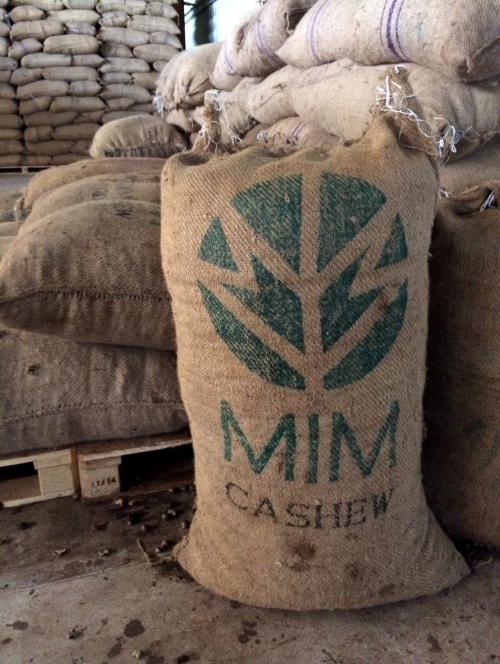ACA Quality and Sustainability Seal Highlight: Mim Cashew
The ACA Seal Program was launched in 2012 with the intention of improving and standardizing the quality, safety, and social components of cashew processing in Africa. Six African cashew processing facilities have achieved ACA Seal certification so far, and several more are currently implementing measures that will enable them to become Seal-approved within the next year or two. In October 2014, we spoke with the CEO of Mim Cashew, Mr. Joseph Yeung, to discuss the ways in which the ACA Seal has impacted the operations at his factory.

Mim Cashew was founded in 2008 with an installed capacity of approximately 200 to 300 metric tons (MT) per year – a modest but respectable amount for a company transitioning the land from a poultry farm into a high-functioning cashew processing facility. From its foundation until 2013, each year the factory’s capacity increased by an additional 300 MT; this year, the factory management chose to focus instead on improving efficiency.
Prior to 2013, Mim experienced a labor shortage due to the arduous tasks associated with the piece-work model of processing (in which workers are paid according to the quantity of cashews processed). It takes a great deal of additional time and labor to determine the precise amount of cashew kernels produced per person. Thus, Mr. Yeung implemented a new system in which wages are determined by shifts worked by each employee. This saved a great deal of time, enabling many more workers to focus on the processing of the cashews, rather than expending energy determining exact weights and quantities per person.
Furthermore, this year the work day was shortened slightly, ending around 3pm rather than 5pm or 6pm. This served as a motivational tool for the mostly female employees: it prevents exhaustion, and provides ample time for them to return to their homes to prepare meals and spend time with their children, thus significantly boosting staff morale.
The revenue generated from this increase in productivity permitted Mr. Yeung to hire more employees, who in turn contributed to greater production, thereby creating a cycle of increased production reinforced by a larger base of labor. Thus, while about 1,300 MT were processed in 2012, 2013 experienced a leap to 3,500 MT. This trend will continue in 2014, with the expected volume of 4,500 MT. The majority of Mim’s employees are women (about 85%), most of whom work in the shelling and peeling stages of cashew processing. Since the workers come from the surrounding community, the local economy has received an additional $90,000 USD via workers’ wages since 2008.
With such a solid foundation and willingness to adopt new practices and policies in order to advance, Mim was always a promising candidate for the ACA Seal program, and remains a compelling example of its usefulness. It is clear that the factory was built with certain principles: as Mr. Yeung puts it, “we set a very high standard for ourselves.” Having worked previously with organizations such as TechnoServe and the African Cashew Initiative, Mim already had a general conception of the pillars which characterize the ACA Seal. During the initial implementation phase of the Seal Program in 2012, the company faced very few obstacles and quickly qualified for the Seal. In October 2014, Mim was approved for the third consecutive year.
“Daily production is constantly checked and tested,” says Mr. Yeung, explaining how the factory upholds the standards demanded by the Seal.

While processing capacity, efficiency, and product safety and quality have increased dramatically since 2008, the factory has recently been faced with a major obstacle to the continuation of this trend: at the beginning of the last cashew season, Cote d’Ivoire announced a ban on transit of raw cashew nuts (RCN) across land borders, resulting in most RCN being transported via the Port of Abidjan and exported to high-processing countries such as India and Vietnam. Mim previously sourced a great deal of its RCN from Cote d’Ivoire; in fact, prior to the ban, the factory had planned to import 2,000 MT of RCN from its western neighbor. Coupled with Ghana’s lack of protective measures to retain its own RCN for domestic processing, Mim and other Ghanaian cashew processing plants now face major shortages of raw material.
However, for Mim, the effects of the Ivoirian export ban have not been as harmful as for other medium-sized Ghanaian processors, due to its status as a Seal-certified factory. It has received recognition from international buyers, particularly in the US, for its high quality and admirable labor standards. The fact that ACA’s Seal of approval is stamped on each exported box increases its attractiveness to international buyers, who increasingly choose products which are compatible with international standards of quality and sustainability. In fact, when its management attends the World Cashew Convention in Dubai early next year, Mim hopes to expand its network of buyers into the Middle East, using the ACA Seal as part of its marketing platform. So, while the Ivorian block on raw nut export is certainly less than ideal, the international exposure and loyalty of buyers gained largely through Seal certification has ensured that Mim’s future remains bright.



